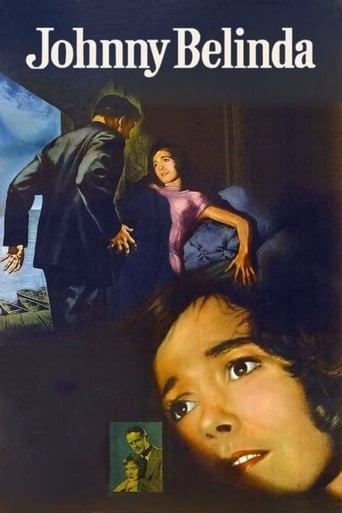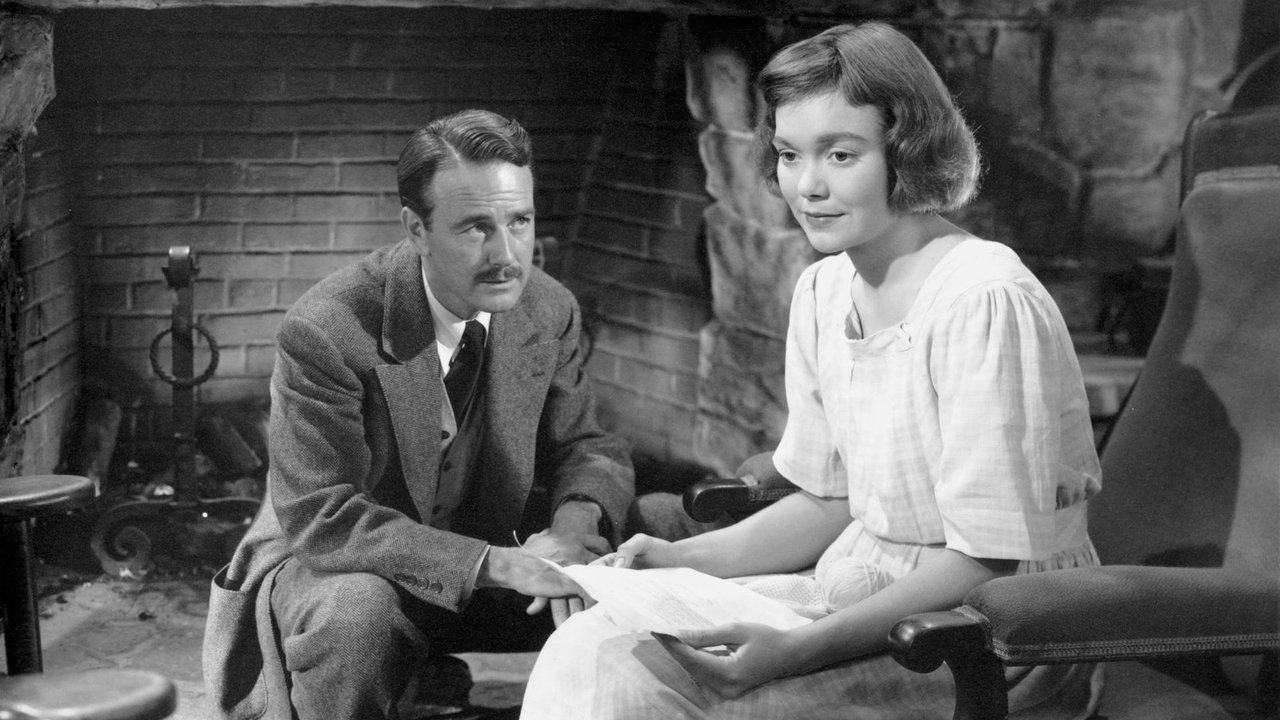Dalbert Pringle
Well, I, for one, don't much care whether actress Jane Wyman did win an Oscar for her "Best Actress" performance here in this film, or not - I still rate Johnny Belinda as one of the most sordid and deeply depressing pictures that I've ever seen, bar none.This film's story is so relentlessly awful from start to finish, that I can't possibly imagine how anyone could ever consider this as entertainment. I mean, I certainly wasn't in the least bit "entertained" by this one's story.The fact that Johnny Belinda's story was based on a real-life incident doesn't help matters much at all, either. In fact, from my perspective, it makes matters much worse when one realizes that, yes, people really are this horribly awful to one another in real life, as well.19 year-old Belinda MacDonald is an extremely shy deaf-mute who, being a victim of circumstance, has very little self-esteem. Belinda lives with her dirt-poor father and aunt in a run-down, little dwelling on the outskirts of a small, isolated, fishing village, some miles away from Cape Breton, Nova Scotia, Canada.Belinda's father and aunt treat her pretty much like nothing but an imbecile, never paying her much mind or care. A kindly, sympathetic doctor in town takes an unselfish interest in Belinda and devotes much of his time to teaching her the necessity of sign-language and lip-reading.One dreadful day, while wandering around aimlessly near the woods, Belinda is attacked and, yes, savagely raped by a brutish, local fisherman named Rocky McCormick.Being the totally frightened creature that she is, Belinda remains completely silent about this traumatic incident and as a result becomes even more withdrawn than ever. When it is soon discovered that Belinda is, in fact, very pregnant, the crap really hits the fan when (courtesy of the simple, ignorant townsfolk) the caring doctor is the one who gets blamed for raping Belinda.Johnny Belinda's oppressively bleak story is truly an ugly one. Its cast may be strong, but this, alone, just isn't sufficient enough to pull this one's wretched story out of the mire and muck of a "real-life" human tragedy.It's hard to imagine that a film of this sort was actually made in 1948.
Alan J. Jacobs
I just saw Johnny Belinda for the first time, and it's wonderful cinema. I kept being reminded of later films I admire, and see where they could have learned elements of their style. The face, that beautiful face of Jane Wyman, how expressive, how poignant! No wonder Reagan fell for her, she was glorious, and without saying a word. And I was watching also the shadows and light, and thought, how very European, and in fact it was by a Romanian-born director, Jean Negulesco. Its setting had elements of the American west, but it was set in Cape Breton, Canada, and portrayed families that fished and farmed and had little contact with the rest of the world. It portrays, a bit melodramatically, small-town prejudice and ignorance, and tackles the issue of rape rather bravely for the time. The Lew Ayres character was a bit too goody-goody for my taste, not much nuance, but he carried off the role well. I've now got to see him in the Dr. Kildare movies.
jpdoherty
Warner Bros. JOHNNY BELINDA (1948) is yet another highly regarded and unforgettable Hollywood classic offering from its Golden Age! From the exemplary performances to the brilliant low key monochrome Cinematography to its arresting music score JOHNNY BELINDA quite rightly deserves a revered place in the history of the Hollywood film! From a successful play by Elmer Harris it was stylishly written for the screen by Irmgard Von Cube and Allen Vincent and strikingly directed by Jean Negulesco.The story centers on a drab and shabby deaf mute girl Belinda MacDonald (Jane Wyman giving the performance of her life) who with her father (Charles Bickford) and her aunt (Agnes Moorhead) endeavour to eke out a livelihood on a post war Nova Scotia farm. She is befriended by a young doctor (Lew Ayres) who takes her under his wing to teach her sign language. Later the girl is brutally raped by an unscrupulous villager (Stephen McNally) becomes pregnant and has a child. Throughout her predicament she is supported by the compassionate doctor. Finally when the baby's father tries to take the child for himself Belinda kills him. She is arrested for murder but when it comes out who the rapist was and that she killed only out of defence of her baby she is exonerated. Wyman is quite stunning as the hapless girl and rightly deserved the Acadamy Award she received for her adroit performance! Excellent too was Charles Bickford in his nominated role as Belinda's father and even better was Agnes Moorhead (sporting a perfectly clipped Scottish accent) who won a nomination as Belinda's erstwhile crusty aunt Aggie. Nominated also was genius Cinematographer Ted McCord whose wonderful coastal imagery at Mendocino and Pebble Beach locations in California were nothing short of breathtaking!Another stunning aspect of this exceptional motion picture is the music by the great Max Steiner! There is a distinctive Scottish flavour permeating the score which aptly points up the Nova Scotia setting. For instance in the marvellous Main Title the composer makes reference to Robert Burns' "O Poorith Cauld" as well as the Canadian national song "Maple Leaf Forever" which is altogether very appealing when heard over the film's beautiful aerial shot of the pretty fishing village at the opening of the picture. The highlight of the score is, of course, the winsome and thoroughly engaging lullaby the composer wrote for the infant Johnny. First heard when the doctor informs Belinda "you're going to have a baby" and then when the child is born. This inspired hum inducing theme - the score's most memorable tune - is then heard throughout the rest of the film soaring to uplifting beauty in the closing scene. Other splendid cues are for the moving sequence where Belinda recites The Lord's Prayer in sign language at the wake of her slain father and in stark contrast the music for the violent rape scene where stabs of screaming and shrieking strings, in their topmost register, drive home the brutality of the moment. This was the genius that was Max Steiner! Ever the consummate dramatist and film's emphatic musical commentator! 1948 was a banner year for the indefatigable composer! Besides JOHNNY BELINDA - which garnered him an Acadamy Award nomination - he also scored ten other pictures which included such masterworks as "The Adventures Of Don Juan", "Treasure Of The Sierra Madre" and "Key Largo".JOHNNY BELINDA was remade three times for television in 1967, 1969 and again in 1982. Each version was quickly dismissed and are now totally forgotten unlike Warner's awesome 1948 original which has and will continue to stand the test of time!
kenjha
Wyman has the role of her career as a naive, deaf-mute young woman in a small Canadian town in the 19th century who is raped by a local hoodlum. She won an Oscar for her word-less performance, beating out Olivia De Havilland for "The Snake Pit." There are also fine performances from Ayers as a kindly doctor who takes interest in Wyman, Bickford as her tough father, and Moorehead as her aunt. The location cinematography is beautiful and it is sensitively directed by Negulesco. Other than a somewhat melodramatic courtroom scene, it is quite understated and surprisingly mature in handling a controversial subject, given the era in which it was made.



 AD
AD




